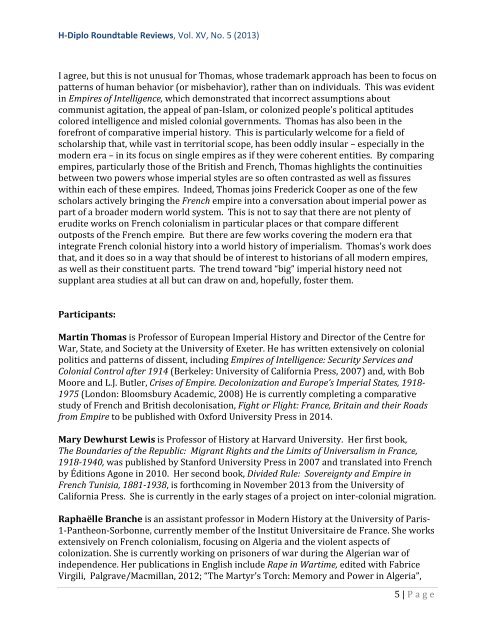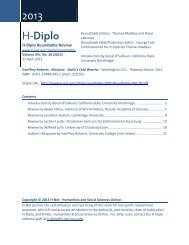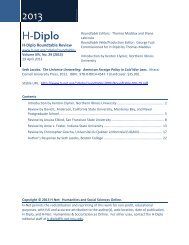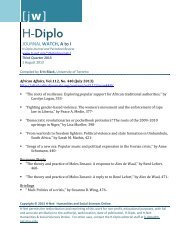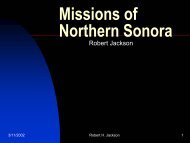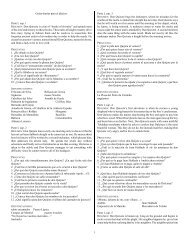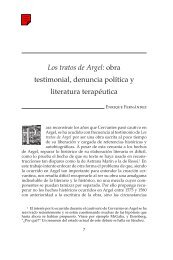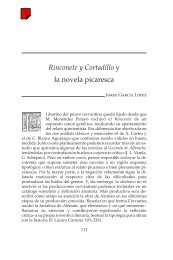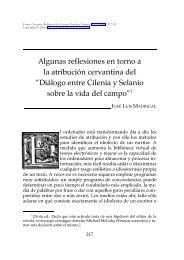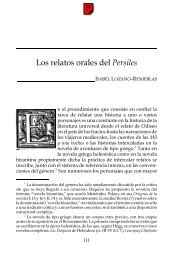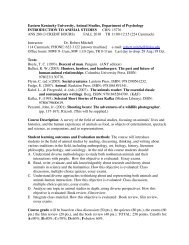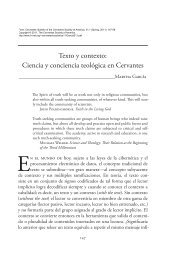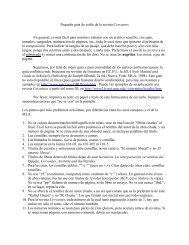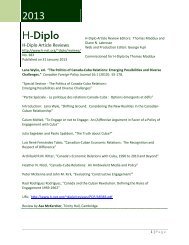H-Diplo Roundtable on Martin Thomas. Violence and ... - H-Net
H-Diplo Roundtable on Martin Thomas. Violence and ... - H-Net
H-Diplo Roundtable on Martin Thomas. Violence and ... - H-Net
Create successful ePaper yourself
Turn your PDF publications into a flip-book with our unique Google optimized e-Paper software.
H-<str<strong>on</strong>g>Diplo</str<strong>on</strong>g> <str<strong>on</strong>g>Roundtable</str<strong>on</strong>g> Reviews, Vol. XV, No. 5 (2013)<br />
I agree, but this is not unusual for <strong>Thomas</strong>, whose trademark approach has been to focus <strong>on</strong><br />
patterns of human behavior (or misbehavior), rather than <strong>on</strong> individuals. This was evident<br />
in Empires of Intelligence, which dem<strong>on</strong>strated that incorrect assumpti<strong>on</strong>s about<br />
communist agitati<strong>on</strong>, the appeal of pan-Islam, or col<strong>on</strong>ized people’s political aptitudes<br />
colored intelligence <strong>and</strong> misled col<strong>on</strong>ial governments. <strong>Thomas</strong> has also been in the<br />
forefr<strong>on</strong>t of comparative imperial history. This is particularly welcome for a field of<br />
scholarship that, while vast in territorial scope, has been oddly insular – especially in the<br />
modern era – in its focus <strong>on</strong> single empires as if they were coherent entities. By comparing<br />
empires, particularly those of the British <strong>and</strong> French, <strong>Thomas</strong> highlights the c<strong>on</strong>tinuities<br />
between two powers whose imperial styles are so often c<strong>on</strong>trasted as well as fissures<br />
within each of these empires. Indeed, <strong>Thomas</strong> joins Frederick Cooper as <strong>on</strong>e of the few<br />
scholars actively bringing the French empire into a c<strong>on</strong>versati<strong>on</strong> about imperial power as<br />
part of a broader modern world system. This is not to say that there are not plenty of<br />
erudite works <strong>on</strong> French col<strong>on</strong>ialism in particular places or that compare different<br />
outposts of the French empire. But there are few works covering the modern era that<br />
integrate French col<strong>on</strong>ial history into a world history of imperialism. <strong>Thomas</strong>’s work does<br />
that, <strong>and</strong> it does so in a way that should be of interest to historians of all modern empires,<br />
as well as their c<strong>on</strong>stituent parts. The trend toward “big” imperial history need not<br />
supplant area studies at all but can draw <strong>on</strong> <strong>and</strong>, hopefully, foster them.<br />
Participants:<br />
<strong>Martin</strong> <strong>Thomas</strong> is Professor of European Imperial History <strong>and</strong> Director of the Centre for<br />
War, State, <strong>and</strong> Society at the University of Exeter. He has written extensively <strong>on</strong> col<strong>on</strong>ial<br />
politics <strong>and</strong> patterns of dissent, including Empires of Intelligence: Security Services <strong>and</strong><br />
Col<strong>on</strong>ial C<strong>on</strong>trol after 1914 (Berkeley: University of California Press, 2007) <strong>and</strong>, with Bob<br />
Moore <strong>and</strong> L.J. Butler, Crises of Empire. Decol<strong>on</strong>izati<strong>on</strong> <strong>and</strong> Europe’s Imperial States, 1918-<br />
1975 (L<strong>on</strong>d<strong>on</strong>: Bloomsbury Academic, 2008) He is currently completing a comparative<br />
study of French <strong>and</strong> British decol<strong>on</strong>isati<strong>on</strong>, Fight or Flight: France, Britain <strong>and</strong> their Roads<br />
from Empire to be published with Oxford University Press in 2014.<br />
Mary Dewhurst Lewis is Professor of History at Harvard University. Her first book,<br />
The Boundaries of the Republic: Migrant Rights <strong>and</strong> the Limits of Universalism in France,<br />
1918-1940, was published by Stanford University Press in 2007 <strong>and</strong> translated into French<br />
by Éditi<strong>on</strong>s Ag<strong>on</strong>e in 2010. Her sec<strong>on</strong>d book, Divided Rule: Sovereignty <strong>and</strong> Empire in<br />
French Tunisia, 1881-1938, is forthcoming in November 2013 from the University of<br />
California Press. She is currently in the early stages of a project <strong>on</strong> inter-col<strong>on</strong>ial migrati<strong>on</strong>.<br />
Raphaëlle Branche is an assistant professor in Modern History at the University of Paris-<br />
1-Panthe<strong>on</strong>-Sorb<strong>on</strong>ne, currently member of the Institut Universitaire de France. She works<br />
extensively <strong>on</strong> French col<strong>on</strong>ialism, focusing <strong>on</strong> Algeria <strong>and</strong> the violent aspects of<br />
col<strong>on</strong>izati<strong>on</strong>. She is currently working <strong>on</strong> pris<strong>on</strong>ers of war during the Algerian war of<br />
independence. Her publicati<strong>on</strong>s in English include Rape in Wartime, edited with Fabrice<br />
Virgili, Palgrave/Macmillan, 2012; “The Martyr’s Torch: Memory <strong>and</strong> Power in Algeria”,<br />
5 | P age


